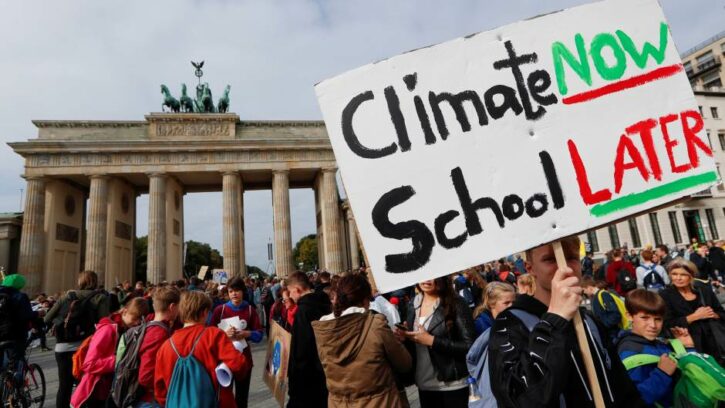
On Friday, people all over the world are expected to walk out of their schools and workplaces to demand action to address the global climate crisis. Here's what you should know.
What's happening?
Young people are asking others all over the world to join them in global climate strikes starting Friday. More events will take place before another big day of action September 27.
Students across the US and beyond are planning to walk out of class to call attention to the issue.
But everyone is invited to express solidarity and “disrupt business as usual,” organizers say.
“Together, we will sound the alarm and show our politicians that business as usual is no longer an option,” they say. “The climate crisis won't wait, so neither will we.”
Who's organizing the strikes?
The individual strikes are being organized and executed by young people in their own towns and cities across the world, much like last year's national school walkouts aimed at combating gun violence.
Notable among the organizers is 16-year-old Swedish climate activist Greta Thunberg. She made headlines this week by sharing a fist-bump with former President Barack Obama and testifying before a congressional committee, imploring lawmakers to “take real action.”
Thunberg first garnered international attention by skipping school and staging sit-ins outside the Swedish Parliament. That grew into a movement called Fridays for Future, and now, students all over the world participate.
But Friday's global climate strikes are meant to include everyone.
“We feel a lot of adults haven't quite understood that we young people won't hold off the climate crisis ourselves,” Thunberg and an international group of activists wrote in an invitation announcing the strikes.
“Sorry if this is inconvenient for you,” they said. “But this is not a single-generation job. It's humanity's job.”
Where are the strikes taking place?
As of Tuesday, 4,638 events were slated to take place in 139 countries, according to Thunberg. CNN has not independently confirmed that number.
But the organizers’ website shows events set for major cities like New York, Los Angeles, London, Berlin, Moscow and Hong Kong.
In New York, 1.1 million students will be allowed to skip class and participate (with their parents’ permission), the city's Department of Education said.
You can check the Global Climate Strikes website to see if there's an event near you. Adults who want to participate are asked to check if there's a youth-led action in their community to support.
What do strikers want?
Climate change will most directly impact young people, organizers say. But that doesn't mean it shouldn't be an issue on everyone's minds. They want allies.
Strikers are also demanding “climate justice” to cast the climate crisis as not just an environmental issue, but also an ethical obligation.
The hope is the strikes will show world leaders that it's not just young people who want climate change to be addressed.
“September's climate strikes will kickstart a huge wave of action and renewed ambition all over the world,” organizers say.
Friday's strikes will take place ahead of the United Nations’ Climate Action Summit on Monday.
UN Secretary-General António Guterres has challenged world leaders to gather in New York and share “concrete, realistic plans” to reduce greenhouse gas emissions.




